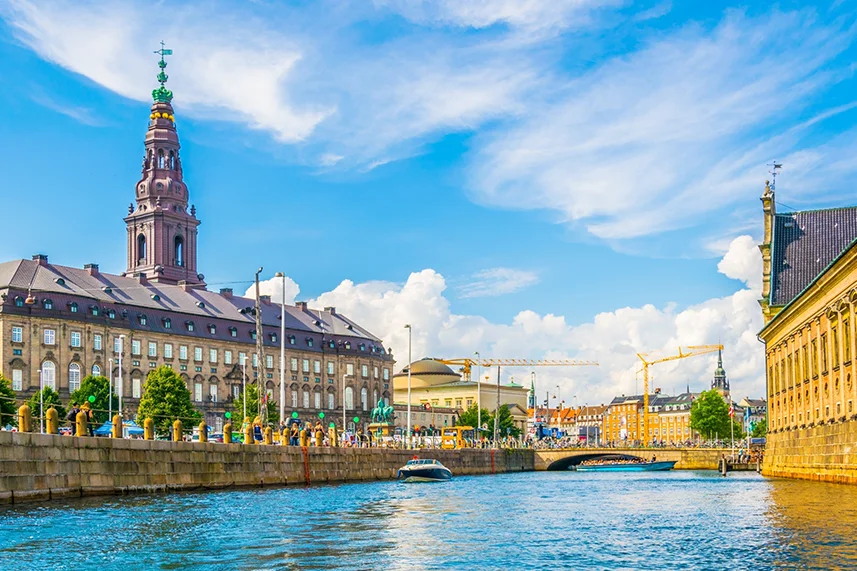
Study in Denmark
Denmark, a European nation situated southwest of Sweden and south of Norway, shares its southern border with Germany. It is a politically sovereign country known as the Realm of Denmark, comprising metropolitan Denmark, the independent districts of the Faroe Islands, and Greenland in the North Atlantic Sea. Covering an area of 42,943 square kilometres, Denmark boasts a well-developed educational system and hosts numerous prestigious institutions. With over 30 higher education institutions offering more than 500 English-taught programs, Denmark, like many other countries, is home to comprehensive research institutions and university colleges, focusing on practical education.
Denmark's rich history is steeped in ancient monarchies and Nordic traditions, contributing to a unique and diverse culture. Students will discover exceptional universities and vibrant university life in Denmark, offering a distinct experience from their previous educational encounters. Danish students are known for their academic excellence and actively participate in festivals and gatherings celebrating their cultural heritage.
Highly Ranked Universities: Denmark's universities consistently rank among the best in the world for international students. They offer a diverse and enriching environment with a strong emphasis on international student exchange programs. Notable institutions include the University of Copenhagen and the University of South Denmark.
Happiest Country in the World: Denmark is renowned as one of the happiest countries globally, providing a safe and joyful environment for all residents. It achieves high scores in various well-being indicators, such as GDP, life expectancy, gender equality, and low corruption levels. Denmark also emphasizes personal freedoms, social security, and a healthy lifestyle.
Student Grants and Living Costs: Denmark is relatively affordable to live in. Monthly living expenses range from 700-800 Euros in smaller towns to up to 1500 Euros in major cities like Copenhagen. Moreover, a variety of grants and scholarships are available for students based on merit, financial need, and sometimes partnerships with other countries.
University Fees in Denmark: Higher education is free for Bachelor's and Master's students from the European Union (EU), European Economic Area (EEA), Switzerland, and those participating in exchange programs. If you hold a permanent or temporary residence visa in Denmark or if one of your parents is a non-EU/EEA national working in Denmark, you can also study for free. Tuition fees for non-EU/EEA citizens typically range from 6,000 to 16,000 EUR per academic year, with specialized programs potentially costing more depending on the location.
Opportunity to Learn While You Earn: International students who obtain a residence permit in Denmark are granted a legal work permit. The Danish government allows international students to work up to 20 hours a week during the academic year (from September to May) and up to 37 hours per week during summer breaks (from June to August). This provides a unique opportunity to gain practical experience while studying.
Studying in Denmark not only offers a world-class education but also a high quality of life, financial support options, and the chance to gain work experience alongside your studies.
Documents Required:
- Evidence of English Language Proficiency: You may need to provide proof of your English language proficiency, such as IELTS or TOEFL scores, depending on the language of instruction at your chosen university.
- Receipt of Residence Permit Fee Payment: You should provide evidence of payment of the residence permit fee, which was mentioned as 255 EUR in your description. Verify the current fee at the time of your application.
- Sufficient Funds: You must demonstrate that you have enough funds to cover your living expenses in Denmark, typically around 1,000 EUR per month. Bank statements or financial guarantees can be used as proof.
- Acceptance Letter: You will need the official acceptance letter from the university in Denmark where you have been admitted to a program.
- Application Form: Fill out the visa or residence permit application form completely and accurately. This form is typically available on the website of the Danish embassy or consulate in your home country.
- Valid Passport: Ensure that your passport is valid for your intended stay in Denmark and contains blank visa pages for the visa sticker.
- Passport-Size Photos: Provide passport-size photographs as per the specific requirements mentioned by the Danish authorities. Generally, two passport-sized photos are required.
- Travel Insurance: It's advisable to have comprehensive travel insurance that covers health, accidents, and repatriation for the duration of your stay in Denmark.
- Study Program Information: Provide detailed information about your study program, including the curriculum, course duration, and any specific details required by the authorities.
- Proof of Accommodation: Show evidence of your accommodation arrangements in Denmark during your studies. This could be a rental agreement or a housing contract.
- Registration Certificate: You may need to register with the local authorities in Denmark and obtain a registration certificate after your arrival.
- Appointment with Regional State Administration: You may be required to make an appointment with the Regional State Administration within a specified time frame after your arrival in Denmark for certain administrative processes.
- Biometric Data: Non-EU/EEA citizens over the age of 18 may need to provide biometric data, including photographs, fingerprints, and signatures, as part of the visa application process.
Please remember that the specific requirements and procedures can vary depending on your nationality, the type of program you are enrolling in, and any recent changes in Danish immigration policies. Always consult the official website of the Danish embassy or consulate and follow their guidance carefully when preparing your student visa application.
Frequently asked questions of Study in Denmark
You typically need a valid passport, proof of proficiency in English (e.g., TOEFL or IELTS scores), and for non-EU/EEA students, a student visa. You'll also need to provide educational certificates to prove your qualifications.
Not necessarily. Many programs, especially at the postgraduate level, are offered in English. However, learning Danish might be beneficial for daily life and part-time job opportunities.
After gaining admission to a Danish institution, you can apply for a residence permit (which acts as a student visa) through the Danish embassy or consulate in your home country.
Tuition can range from free for EU/EEA students to between 6,000 to 16,000 EUR per year for non-EU students. Living expenses can range from 800 to 1,200 EUR per month.
Yes, there are a number of scholarships and grants available for non-EU students, offered by the Danish government and institutions.


